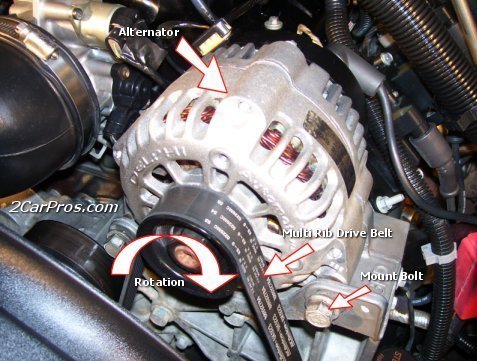Yes, parts can be replaced individually, but that will be strictly a do-it-yourself project. No professional will do this for a customer's vehicle because they can't insure the quality of the repair. If a part fails or something goes wrong, they have to do the work all over again, for free. Also, just the labor charge, not including the parts, to do the job this way would be much higher than the cost of a rebuilt generator.
The next problem is this is by far the worst generator design ever developed. Besides the very high failure rate, it is almost impossible to get it apart. You should have less trouble if you just replace the front bearing, but it doesn't make sense to tear it apart that far, then fail to replace the other common items. There are repair kits available at most farm and home stores. They include the voltage regulator, diode block, brushes, and one of the bearings.
Unlike GM's older design from 1986 and before, which was a pretty good design, this one has no test point available, so there is no way to tell if the voltage regulator, brushes, or diode block have caused a failure to charge. Also, just to get those parts removed is a lesson in frustration, and requires desoldering three wires at the same time, through slotted holes in the housing. Most of the time you'll break the flimsy tabs off the diode block, then that is junk, but you still don't know if the other parts are defective. To prevent having to do the job over, all the parts get replaced. By the time you're done, for the sake of your sanity, you're better off buying a professionally-rebuilt generator with a warranty.
The bearing problem is the second most common problem. The biggest problem is the failure to charge, and that can lead to multiple repeat failures. For future reference, you should be aware that due to their design, these generators develop huge harmful voltage spikes that can destroy the internal voltage regulator and diodes, and interfere with computer sensor signals. The key component in damping and absorbing those spikes is the battery, but as they age and the lead flakes off the plates, they lose their ability to do that.
It is not uncommon to go through four to six replacement generators in the life of the vehicle. To reduce that number of repeat failures, always replace the battery at the same time, unless it is less than about two years old. The old battery will work fine in an '86 or older model.
The standard generator for your car is a 140-amp unit. The parts that come in the repair kits are the same for most GM generators. The different current ratings come from the stator winding. That's the stationary coils. Those rarely need to be replaced.
If you decide to replace the generator, don't be afraid to shop around for the best price. A friend with a '99 Suburban replaced his generator for the third time, and that is when he found one for over $200.00 with only a two-year warranty, and a different one from a different company with a lifetime warranty for $50.00 less.
Tuesday, December 24th, 2019 AT 2:09 PM



